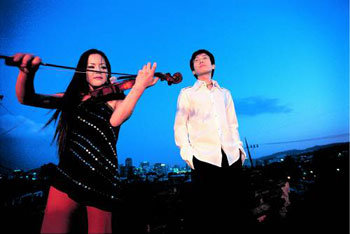Orientango

Buenos Aires, Argentina, is 36 hours away by air from Seoul. Even today, the melody of the tango and the sorrow and sadness of poor migrant workers flow on Tango Street of this port city.
The Korean tango duo Orientango calls Buenos Aires their spiritual home. The duo is leaving for Argentina again after releasing four albums and giving many performances in Korea since its homecoming concert at the Sejong Center for the Performing Arts in 2002. Last Tango in Seoul at Baekam Art Hall in Samsung-dong, Seoul, from February 24 to 26 will be their farewell concert.
The Buenos Aires seashore has a unique, damp scent. I missed the scent of Korea during my 10-year immigrant life. When I returned to Korea in 2001 for a recording, I cried to myself, thinking, This is the scent I have been pining for, said Orientango member Sung Kyung-sun.
Orientango is a duo consisting of violinist Sung Kyung-sun (30) and Pianist Jung Jin-hee (30) who both emigrated to Argentina in their teens. Maybe in part because their loneliness as Korean immigrants can be felt in their music, they were the first Asians to be selected as official tango musicians by Buenos Aires.
At their debut at the Manzana De Las Luces national concert hall in July 2000, Orientango received a standing ovation from local tango musicians, including the wife of Astro Piazzolla, the legendary tango writer.
Piazzollas wife said, I sensed sincerity in your tango because you felt the scent and feeling of Buenos Aires while living here for 10 years. This is the equivalent of a Korean being moved after hearing a migrant worker who has lived in Korea for years sing Koreas Arirang song. In tango, emotional feelings are more important than technique, said Jung Jin-hee.
They both say that Argentineans show tears when Orientango plays Korean songs like A Orilla Del Ri (Eummaya Nunaya) and La Primavera De Mi Tierra (Gohyangeui Bom). Orientango believes that the Korean emotion of deep regret (han) is well suited for tango.
The two, who claim to be tango missionaries, have not only held performances at concert halls, but also street performances at schools or factories of migrant workers and hospitals.
Tango is a type of music that pursues freedom. It is not a type of music played only on a spectacular stage with bright lights. I played my violin impromptu with a person playing the bandoneon (a keyboard instrument similar to an accordion) on Tango Street in Buenos Aires. You could say I helped that bandoneon player make some money that day, said Sung.
The duos upcoming concert at small concert hall will show Orientangos musical range with classic tango, tango with a modern band, and electric tango pieces on the program. Songs such as Pasion Triste and El Tango Para Violin in their new album released last December are so dynamic that they are sure to drive the audience into a frenzy.
Tango is a genre that can experiment with music from around the world, like bossa nova tango, hip hop tango, and Korean tango, Jung said. I want to travel around the world seeking new kinds of music after going back to Argentina to recharge my tango senses.
Admission to the concert is 60,000 won. For more information, call 02-324-3814.
Seung-Hoon Cheon raphy@donga.com




![“한동훈, 정치생명 걸고 무소속 출마해 평가받는 것 고려할만”[정치를 부탁해]](https://dimg.donga.com/c/138/175/90/1/wps/NEWS/IMAGE/2026/01/19/133186982.1.jpg)


